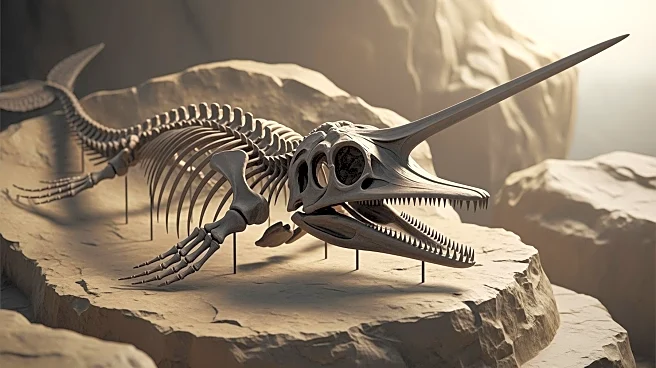What's Happening?
Paleontologists have resolved a long-standing mystery surrounding a 'sword dragon' skeleton discovered on the UK's Jurassic Coast. The skeleton, found near Dorset's Gold Cap in 2001, has been identified as a new species of ichthyosaur, named Xiphodracon
goldencapensis, or the 'Sword Dragon of Dorset.' This marine reptile, which lived during the Pliensbachian period approximately 193 to 184 million years ago, was an air-breathing creature that dominated ancient oceans. The discovery was announced in a press release from the University of Manchester, highlighting the skeleton's exceptional preservation and its significance in filling gaps in the ichthyosaur evolutionary record. Dean Lomax, a research fellow at Manchester University, played a key role in naming the species, emphasizing the importance of the find in understanding the extinction and emergence of ichthyosaur families during that era.
Why It's Important?
The identification of Xiphodracon goldencapensis is significant for paleontology as it provides crucial insights into the evolutionary history of ichthyosaurs. This discovery helps scientists better understand the faunal turnover during the Pliensbachian period, a time marked by the extinction of several ichthyosaur families and the emergence of new ones. The well-preserved skeleton offers a rare glimpse into the anatomy and lifestyle of these ancient marine reptiles, potentially revealing information about their diet and ecological role. This finding not only enriches the fossil record but also aids in reconstructing the biodiversity and environmental conditions of prehistoric oceans, contributing to broader scientific knowledge about Earth's history.
What's Next?
The discovery of Xiphodracon goldencapensis is expected to spur further research into the Pliensbachian period and the evolutionary dynamics of ichthyosaurs. Scientists may conduct additional studies on the fossil to uncover more details about its biology and ecological interactions. This could lead to new insights into the adaptive strategies of marine reptiles during periods of environmental change. The findings may also prompt paleontologists to re-examine other ichthyosaur fossils for potential reclassification or new discoveries, enhancing our understanding of marine life evolution.
Beyond the Headlines
The discovery of the 'Sword Dragon of Dorset' highlights the importance of paleontological research in uncovering Earth's ancient past. It underscores the role of well-preserved fossils in providing a window into evolutionary processes and environmental shifts. This finding also illustrates the collaborative nature of scientific research, involving multiple experts and institutions to piece together historical puzzles. As paleontologists continue to explore and analyze such discoveries, they contribute to a deeper appreciation of the planet's biological heritage and the complex history of life on Earth.


















